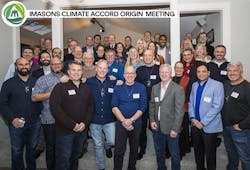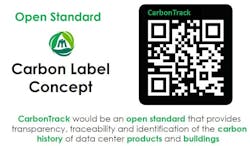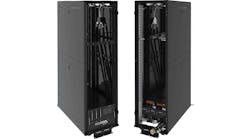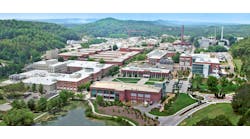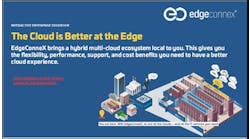Cloud Platforms, Data Center Builders Join iMasons Accord to Slash Carbon
In a bid to hasten the technology sector’s response to climate change, the largest cloud computing providers will join a new data center industry initiative to slash the carbon output of the infrastructure powering the Internet.
Amazon Web Services, Google, Microsoft and Meta are among more than 70 companies that have agreed to take additional steps to track and reduce the environmental impact of data centers, creating a new level of carbon accountability.
The iMasons Climate Accord (ICA), which was put together by the industry group Infrastructure Masons, was announced at a conference in Monaco. In addition to the four major cloud platforms, the historic effort will include more than 40 major providers of data center space, led by the four largest – Equinix, Digital Realty, NTT Global Data Centers and CyrusOne. Also on board are Schneider Electric and Vertiv, the largest supplies of power and cooling equipment for data centers.
“The ICA represents an unprecedented collaboration between leading digital infrastructure companies to accelerate our journey to carbon neutrality,” said Dean Nelson, the founder and CEO of Infrastructure Masons. “Today, we are combining forces to compound the efforts of these firms to make meaningful and sustained progress toward that goal.
“We are all aligned on carbon reduction,” said Nelson. “The goal is global carbon accounting of digital infrastructure, which would influence market-based decisions, and drive our industry to achieve carbon neutrality. That’s the future we should have.”
A Standard to Disclose Carbon Impact
The ICA plans to create an open standard to track the embodied carbon of everything from servers to power to construction materials used to build data centers. The end goal, Nelson said, is to create a “carbon label” for equipment and buildings that deliver Internet services, leveraging the the buying power of the big cloud platforms to create a virtuous cycle of carbon reduction, motivating suppliers to track and report the environmental impact of their products.
A concept for a label for data center carbon tracking. (Image: Infrastructure Masons)
The system envisioned by ICA would enable companies to document their real-world carbon impact and how it is changing. Nelson said the label could be a QR code applied to data center equipment and supplies, as well as the buildings themselves. This new transparency in disclosing carbon impact could simplify the reporting of ESG (environmental, social and governance) performance, which has become a growing priority for corporations and investors.
It’s a big task, but the breadth of the industry participation offers a promising start. In addition to the four big cloud platforms and four largest data center providers, the ICA cooperative features Switch, CloudHQ, Aligned, Compass Datacenters, Cyxtera, DataBank, EdgeConneX, Evoque Data Center Solutions, Iron Mountain Data Centers. Netrality Data Centers. STACK Infrastructure, Vantage Data Centers and Yondr Group.
“The ICA represents an unprecedented collaboration between leading digital infrastructure companies to accelerate our journey to carbon neutrality.”
– Dean Nelson, Infrastructure Masons
The key players in the data center economy are the giant cloud platforms, especially AWS, Meta, Google and Microsoft. All have made great strides in slashing the carbon impact of their own server farms known – known as Scope 1 emissions – as well as the Scope 2 emissions in energy purchases.
But as part of ICA, they can bring market-moving clout into the effort to measure Scope 3 emissions, the indirect carbon impact from purchased goods and services.
Major Platforms Express Support
“One of the biggest topics of discussion at COP26 was how a lack of reliable and consistent measurement hampers progress on the path to net zero,” said Christian Belady, Vice President and Distinguished Engineer – Datacenter Advanced Development at Microsoft. “We also know that while many companies are making valiant efforts to improve their carbon footprints, Scope 3 emissions continue to be the most difficult to control and reduce. We’re delighted to support such a valuable initiative to help bring both measurement and transparency to the datacenter industry.”
“We are excited to help create an open standard for reducing the embodied carbon in data centers, and work with equipment manufacturers to improve energy efficiency across the industry,” said Joe Kava, Vice President, Data Centers at Google. “We have matched 100% of our global electricity use with renewable energy since 2017, and are now working toward operating on 24/7 carbon-free energy as part of our goal to achieve net zero emissions across all of our operations and value chain by 2030.”
“We are excited to help create an open standard for reducing the embodied carbon in data centers, and work with equipment manufacturers to improve energy efficiency across the industry.”
– Joe Kava, Google
“We have set an ambitious goal to reach net zero emissions across our value chain in 2030,” said Rachel Peterson, Vice President of Infrastructure at Meta. “We look forward to partnering with iMasons and others in the industry to find innovative solutions that will reduce our emissions and our impact on the environment and help us all reach our sustainability goals.”
“We are excited to join iMasons to reduce carbon emissions from digital infrastructure,” said Eric Wilcox, Vice President, Data Center Design Engineering at Amazon Web Services. “AWS is committed to achieve net zero carbon emissions by 2040, and we are on a path to power our operations with 100% renewable energy by 2025 – five years ahead of our original target. We cannot do this alone and look forward to working with other forward-thinking companies to decarbonize.”
You Can’t Manage if You Can’t Measure
Data center operators’ large energy use makes them a focal point for climate action. According to research from Infrastructure Masons, there are about 7 million data centers worldwide representing 105 gigawatts of power capacity – about 2.4% of global energy consumption.
Although cloud platforms are already the largest buyers of renewable energy, the intense storms and heat waves of the past several years have brought a growing sense of urgency. Recent UN scientific assessments say fossil-fuel emissions remain too high to prevent intensified global warming, leaving a short window in which countries and corporations can act to head off worst-case outcomes.
“We all have this sense that it’s becoming too late,” said Nelson, who has headed data center teams at eBay and Uber. “All these commitments are great, but if we don’t take action and actually make progress now, we’re not going to make it right. We wanted to bring our community together. If we put labels on things, we’re going to measure it. And when we measure it, we’re going to be able to make changes.”
Some key elements of the accord are still being worked out. The founding coalition companies will establish an independent governing body to define an open standard methodology for measuring and reporting carbon content for data center power, materials and products, as well as a maturity model that would document progress on reducing carbon. This may be similar in concept to the role of The Green Grid in the establishment of PUE (Power Usage Effectiveness) and WUE (Water Usage Effectiveness), the widely-adopted standards for reporting data center energy efficiency and water usage.
Uniting Around a Single Goal
The Infrastructure Masons is a professional association founded to “unite the builders of the digital age.” The group was founded in 2016 by Nelson to chart a course for the fast-growing cloud economy, and has been a leader in promoting sustainability, diversity, and education about data center careers.
The ICA initiative came together through a February meeting convened by Belady, a member of the iMasons advisory council and a key player in the development of the PUE standard. Belady has been among the most outspoken cloud leaders on climate.
“Clouds don’t exist without a planet, or without oceans,” Belady said at an iMasons event last summer. “It’s in all of our interests to work collectively.”
The February meeting sought to unite stakeholders around a single goal that could move the needle on climate action. Carbon reduction emerged as the clear consensus.
“The thing that really drove it was the passionate people in the advisory council,” said Nelson. “They all care very deeply about this.
“We may compete on everything else, but we don’t compete on climate,” said Nelson. “We collaborate on climate. All the companies are going towards the same goal. Working together is where we compound our impact.”

